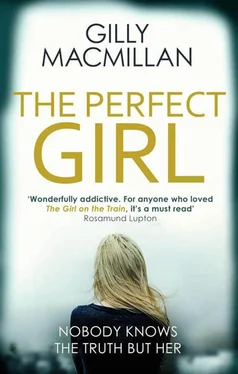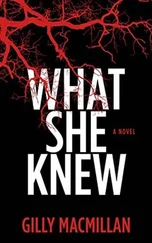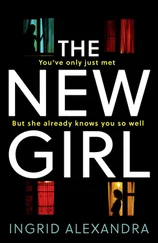‘Has she been interviewed?’
‘Not yet. Social worker just arrived.’
The police weren’t allowed to interview Zoe without an ‘appropriate adult’ present because of her age. If she’d refused to have her mother with her they would have had to wait until a social worker came on shift this morning.
The custody sergeant wore a tight black police top with a high collar and short sleeves that gripped muscular arms, and literally talked down to me from his desk, which was on a raised platform. As he spoke, he tapped efficiently at his keyboard, eyes glued to the screen of his computer monitor.
‘I’ve just had handover so I’m acquainting myself with the details, but she was brought in at about four-thirty after a couple of hours at the hospital.’
I pitied Zoe her hours in the cell. Even my clients who’d been to prison said that they hated being in police custody more than anything. There’s no routine, just four walls, a mattress on a shelf, a toilet that may or may not be properly screened, and a pair of eyes on you at all times, either directly or via the camera.
‘Why didn’t she want her mother?’ I asked him. I was wondering if this girl had been in care, or lived with her father, or was bereaved.
‘We’re not entirely sure. Best guess: ashamed.’
‘Ashamed?’
He shrugged his shoulders and spreads his hands wide, palms upward. ‘Mum’s been sitting in reception since Zoe arrived.’
There had been a lone woman sitting in reception on my arrival, with white-blonde hair and fine features. She was huddled in a corner, and shuddered when the electronic doors ushered in a cold draught with me, and met my eye with the clear gaze of somebody who’s waiting for nothing good at all to happen, and has had no sleep to speak of.
It was a common expression in the waiting rooms I frequented: at police stations, in courtrooms, nobody’s looking forward to what’s going to happen.
That nice-looking woman, who’d been shut firmly out of her daughter’s life at that moment, was my first clue that this case was going to be far from straightforward.
I had no picture in my head of Zoe before I met her. I’d had enough experience by then to know that criminality takes all kinds so you could never predict what your clients would be like, though if I’d had to hazard a guess I might have told you that the girl I was about to meet would be a mature fourteen-year-old, probably a bit rough round the edges, probably a seasoned drinker, maybe a dabbler in the local drugs scene, definitely a party girl.
The girl I met wasn’t like that. The police had taken her clothing at the hospital as evidence, so she was wearing an outfit that the A & E nurses must have had to cobble together for her: oversized grey sweatpants and a blue zipped-up fleece top. She had a dressed wound on one temple and long, white-blonde hair, a shade paler even than her mother’s, which sparkled with tiny, glittery fragments of glass from the accident.
She sat in a moulded plastic chair that was bolted to the floor, her feet were drawn up and her arms were wrapped around her knees. She looked dishevelled and very small. Her cheekbones were fine, her eyes were a bright, clear blue and her skin was as pale as the frost outside. Her hands were tucked into the sleeves of the fleece, which looked grubby on the cuffs: stains from another life that the hospital laundry hadn’t been able to get rid of.
Beside her sat a woman who wore the stoic expression of a seen-it-all social worker. She was middle-aged, with hair cropped short and sharp, and a face that was deeply grooved and greyish from what I would have guessed had been twenty cigarettes a day for twenty years. She had deposited a neat pile of gloves, hat and scarf on to the interview table.
I introduced myself to Zoe and she surprised me by standing up and offering me a timid handshake. Unfolded, she revealed herself to be of medium height and very slight, totally swamped by the borrowed clothing. She looked exceptionally fragile.
We sat down opposite one another.
It wasn’t the beginning of her nightmare – that had happened hours earlier – but it was the moment when I had to begin the delicate process of trying to help her to understand precisely how grave her situation might be.
The Concert
I’m feeling pretty certain that the camera is actually filming when Zoe and Lucas start playing their duet because there’s a red light flashing on the bottom right-hand corner of its screen and a counter appears to be frenetically keeping track of the seconds and milliseconds that are passing.
Zoe and Lucas look great on the podium, as ever: a sweet vision of teenage perfection. They are yin and yang, blonde and dark, an ice princess and her swarthy consort.
I’m one of the first to notice Tom Barlow because the camera tripod and I are positioned just at the side of the aisle, quite near the entrance, so that I can stand up and tend to it without blocking anybody’s view.
I don’t recognise him at first, and by the time I do it’s too late to do anything.
Later, I wonder what might have happened differently if I’d acted at that moment, whether I could have stopped him, and changed the course of things, but it’s pointless speculation because, like the rest of the audience, I do nothing more than watch, open-mouthed, as he shouts, his spittle flecking the air in front of him.
Zoe is the last person in the church to notice him and, when she does, fear jerks her limbs like a puppet on strings, and she scrambles to get off the stage. I don’t blame her. Tom Barlow looks like a man possessed, and he’s a big man.
When Maria stands up and makes a feeble attempt to pacify him he’s having none of it. ‘You have your daughter,’ he says to her, and the words seem to strike her like blows. ‘Don’t tell me what to do. You have your daughter.’
‘I’m so sorry, Tom,’ she says, but he scythes her down with his reply: ‘It’s your fault,’ he says. ‘It was your fault.’
And then there’s a muddle, as people begin to leave their seats and surround Mr Barlow, and he sinks to his knees and begins to sob, and it’s an awful, wrenching sound, a sound to make the hairs on the back of your neck stand up.
I know who he is, because I recognise him from the trial, of course. Zoe’s trial took place in a closed court, because of her age, so I never went inside the actual courtroom but I was still there every day, in the waiting room reserved for families of the accused, and I saw the families of the victims outside the courthouse in the street, day in, day out, huddled in groups.
We kept our distance, to avoid any scenes, but I’m certain I recognise Tom Barlow because his face was in the local paper too. He and the other parents were pictured prominently, black clad and riddled with grief at the funerals of their children.
In the mayhem at the concert, Maria follows Zoe off stage, though before she does there’s a tense exchange between her and her newish husband Chris, during which he seems to question her and she shakes her head vigorously. Maria meets my eye as she goes, she looks stricken, and I mouth, Do you want me to come? She signals that she doesn’t, so I sit down where I am. I’m keen not to draw attention to myself. Others are kneeling beside Tom Barlow, looking after him, so I don’t need to. Best if he doesn’t see me at this point. There’s a possibility that he might recognise me.
I wonder how Tom Barlow knew Zoe was here tonight. Since leaving Devon, she’s changed her surname, broken links with the families, with everything. We all thought she’d left Amelia Barlow’s family a hundred miles away.
Читать дальше












